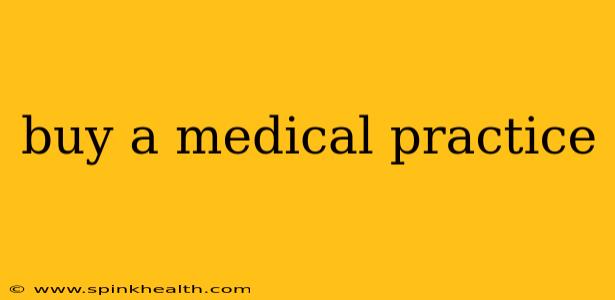The decision to buy a medical practice is a significant one, a blend of ambition, calculated risk, and a deep commitment to patient care. It's not just about acquiring a business; it's about inheriting a legacy, a community connection, and the responsibility of providing high-quality healthcare. This journey, however, can be navigated successfully with careful planning and a strategic approach. Let's explore the key aspects of buying a medical practice, transforming a dream into a thriving reality.
What are the benefits of buying an existing medical practice?
This is a question many aspiring medical professionals grapple with. The advantages are compelling. Instead of starting from scratch, you acquire an established patient base, operational infrastructure, and potentially a strong reputation within the community. This established presence translates into immediate revenue streams and reduces the considerable time and resources typically required for building a practice from the ground up. You're essentially buying a head start.
How much does it cost to buy a medical practice?
The cost of acquiring a medical practice is highly variable and depends on a multitude of factors. Location plays a critical role; practices in high-demand areas naturally command higher prices. The size of the practice, its profitability, the existing equipment, and the value of the patient list all significantly influence the final price. Expect to engage financial advisors and potentially legal professionals to accurately assess the financial implications. Think of it less as a single figure and more as a complex equation with many variables.
What are the different types of medical practices you can buy?
The medical landscape is diverse, offering a range of practice types for acquisition. Solo practices provide a more hands-on approach with complete control, while larger group practices offer collaborative environments and often more administrative support. Specialty practices cater to specific medical needs, while general practices offer broader services. The best fit depends on your personal preferences, medical expertise, and financial capabilities. Consider your long-term goals and choose a model that aligns with your vision.
What are the key steps to buying a medical practice?
Buying a medical practice is not a quick process. It involves meticulous planning, thorough due diligence, and a strategic approach. It starts with identifying potential practices that align with your goals and then meticulously examining their financials, patient demographics, and operational aspects. Negotiating the purchase price and securing financing are crucial steps. And finally, the transition process requires careful planning to ensure a smooth handover and minimize disruption to patient care. Think of this as a multi-stage marathon, not a sprint.
What are the legal and regulatory requirements for buying a medical practice?
Navigating the legal and regulatory landscape is critical. State and federal regulations govern the transfer of medical licenses, patient records, and the compliance requirements of the practice. Engaging legal counsel experienced in healthcare transactions is essential to ensure compliance and protect your interests throughout the process. Overlooking these aspects can lead to costly delays or even legal complications.
How do you finance the purchase of a medical practice?
Securing financing is a significant undertaking. Traditional bank loans, SBA loans, and private equity financing are all potential avenues. Each option comes with its own requirements and considerations. Demonstrating a robust business plan and a strong financial track record is crucial for securing favorable terms. Explore your options carefully and seek professional advice to identify the most suitable financing strategy.
What are some common mistakes to avoid when buying a medical practice?
One of the most common mistakes is underestimating the time and effort involved in due diligence. Thoroughly reviewing all financial records, understanding the practice's operational efficiency, and assessing the patient base's characteristics are essential. Another pitfall is failing to adequately plan for the transition period. Ensure a smooth transfer of patients and operations to minimize disruptions and maintain patient trust. Rushing the process can lead to unforeseen complications and regrets down the line.
Buying a medical practice is a journey requiring careful planning, strategic thinking, and a deep understanding of both the business and healthcare aspects. With thorough preparation and a focused approach, your dream of owning a successful medical practice can become a reality. Remember, seeking professional advice from financial advisors, legal counsel, and experienced healthcare consultants is invaluable throughout this process.

